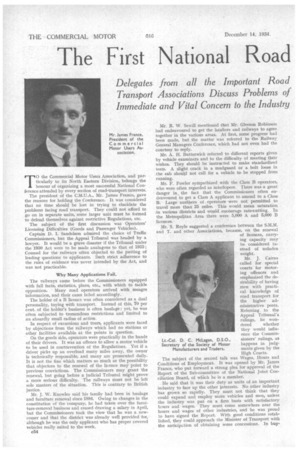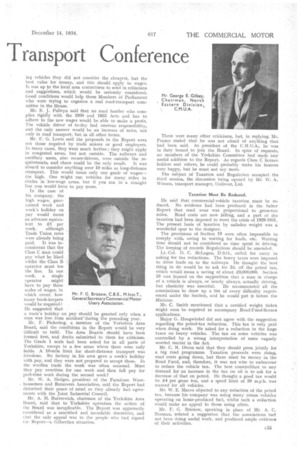The First National Road Transport Conference
Page 108

Page 109

If you've noticed an error in this article please click here to report it so we can fix it.
Delegates from all the Important Road Transport Associations Discuss Problems of Immediate and Vital Concern to the Industry
TO the Commercial Motor Users Association, and particularly to its North Eastern Division, belongs the honour of organizing a most successful National Conference attended by every section of road-transport interests.
The president of the C.M.U.A., Mr. James France, gave the reasons for holding the Conference. It was considered that no time should be lost in trying to elucidate the problems facing road transport. They could not afford to go on in separate units, some larger unit must be formed to defend themselves against restrictive Regulations, etc.
The subject of the first discussion was Operators' Licensing Difficulties (Goods and Passenger Vehicles).
Captain D. I. Sandelson admired the choice of Traffic Commissioners, but the Appeal Tribunal was headed by a lawyer. It would be a grave disaster if the Tribunal under the 1930 Act were to be made analagous to that of 1933; Counsel for the railways often objected to the putting of leading questions to applicants. Such strict adherence to the rules of evidence was never intended by the Act, and was not practicable.
Why Many Applications Fail.
The railways came before the Commissioners equipped with full facts, statistics, plans, etc., with which to tackle opposition. Many road operators arrived with meagre information, and their cases failed accordingly.
The holder of a B licence was often considered as a dual personality, toying with transport. Instead of this, 70 per cent, of the holder's business is often haulage; yet, he was often subjected to tremendous restrictions and limited to an absurdly small radius of action.
In respect of excursions and tours, applicants were faced by objections from the railways which had no stations or other facilities available at the points in question.
On the goods side, operators were practically in the hands of their drivers. It was an offence to allow a motor vehicle to be used in contravention of the Regulations. Yet if a driver picks up an overload many miles away, the owner is technically responsible, and many are prosecuted daily. It is not the fine which matters so Much as the possibility that objectors to the renewal of the licence may point to previous convictions. The Commissioners may grant the renewal, but going before a judicial Tribunal might prove a more serious difficulty. The railways must not he left sole masters of the situation. This is contrary to British justice.
Mr. J. W. Knowles said his family had been in haulage and furniture removal since 1884. Owing to changes in the constitution of the company, he had taken over the furniture-removal business and ceased drawing a salary in April, but the Commissioners took the view that he was a newcomer and that the district was already well provided for, although he was the only applicant who has proper covered vehicles really suited to the work.
c54
Mr. R. W. Sewill mentioned that Mr. Gleeson Robinson had endeavoured to get the hauliers and railways to agree together in the various areas. At first, some progress had been made, but the matter was referred to the Railway General Managers Conference, which had not even had the courtesy to reply.
Mr. A. H. Butterwick referred to different reports given by vehicle examiners and to the difficulty of meeting their wishes. They should be instructed to make standardized tests. A slight crack in a mudguard or a bolt loose in the cab should not call for a vehicle to be stopped from running.
Mr. F. Fowler sympathized with the Class B operators, who were often regarded as interlopers. There was a great danger in, the fact that the Commissioners often endeavoured to get a Class A applicant to amend to a Class B. Large nunibers of operators were not permitted to travel more than 25 miles. This would mean saturation in various districts and would encourage rate-cutting. In the Metropolitan Area there were 5,000 A and 5,000 B licences.
Mr. S. Royle suggested a conference between the S.M.M. and T. and other Associations, because, on the renewal of licences, carrying capacity may be considered instead of unladen weight.
Mr. J. Cairns called for special courts for motoring offences and emphasized the desirability of having men with practical knowledge of road transport for the higher administrative posts. Referring -to the Appeal Tribunal's rulings, he won dered whether they would influence the Commissioners' rulings, as happens in judgments given by the High Courts.
The subject of the second talk was Wages, Hours and Conditions of Employment. It was opened by Mr. James France, who put forward a strong plea for approval of. the Report of the Sub-committee of the National Joint Conciliation Board, of which he is a member.
He said that it was their duty as units of an important industry to face up the other interests. No other industry has grown so rapidly. They must not think that they could expand and employ more vehicles and men, unless the industry was put on a firm basis with satisfactory hours and wages. They must come somewhere near the hours and wages of other industries, and he was proud to have signed the Report. With good conditions established, they could approach the Minister of Transport with the anticipation of obtaining some concessions. In buy
lag vehicles they did not consider the cheapest, but the best value for money, and this should apply to wages. It was up to the local area committees to send in criticisms and suggestions, which would be seriously considered. Good conditions would help those Members of Parliament who were trying to organize a real road-transport committee in the House.
Mr. E. J. Pulleyn said that no road haulier who complies rigidly with the 1930 and 1933 Acts and has to adhere to the new wages would be able to make a profit The vehicle driver of to-day had onerous responsibility, and the only answer would be an increase of rates, not only in road transport, but in all other forms, Mr. F. G. Lewis said the proposals in the Report were not those required by trade unions or good employers. In many cases, they went much farther ; they might apply in congested areas, but not outside. The railways and ancillary users, also owner-drivers, were outside the requirements, and chaos could be the only result. It was absurd to consider anything over 10 miles as long-distance transport. This would mean only one grade of wages— the high. One might run vehicles for many miles in circles in low-wage areas, but if you ran in a straight line you would have to pay more.
In the case of his company, the high wages, guaranteed week and week's holiday on pay would mean an advance equivalent to £1 per week, although Trade Union rates were already being paid. It was inconsistent that the Class C man could pay what he liked whilst the Class B operator must toe the line. In one week, a single operator might have to Pay three scales of wages, in which event, how many book-keepers would be required? He suggested that a week's holiday on pay should be granted only when a man was free from accident-during the preceding year.
Mr. F. Pickering, a member of the Yorkshire Area Board, said the conditions in the Report would be very difficult to fulfil. The Area Boards should have been formed first, and drafts submitted to them for criticism. The Grade 1 scale had been asked for in all parts of Yorkshire, except in a few areas where there were only fields. A 10-mile limit for short-distance transport was frivolous. No factory in his area gave a week's holiday with pay, and they were not prepared to accept these. In the woollen trade the work was often seasonal. Must they pay overtime for one week and then full pay for part-time work during the second week?
Mr. W. A. Hedges, president of the Furniture Warehousemen and Removers Association, said the Report had disturbed their peace of mind as they already had agreements with the Joint Industrial Council.
Mr. A. H. Butterwick, chairman of the Yorkshire Area Board, said that to Yorkshire operators the action of the Board was inexplicable. The Report was apparently considered as a sanctified and inviolable document, and that the only appeal was to the people who had signed the Report—a Gilbertian situation.
Mr. F. G. Bristow, C.B.E., M.Inst.T.,
General Secretary Commercial Motor Users Association.
There were many other criticisms, but, in replying, Mr. France stated that he was not afraid of anything that had been said. As president of the C.M.U.A., he was in duty bound to join the Board. In spite of requests, no members of the Yorkshire Committee had made any useful addition to the Report As regards Class C licence holders and others, he could probably make his hearers very happy, but he must not say more.
The subject of Taxation and Regulation occupied the third session, the discussion being opened by Mr. W. A. Willson, transport manager, Unilever, Ltd.
Taxation Must Be Reduced.
He said that commercial-vehicle taxation must be reduced. No evidence had been produced in the Salter Report that road wear was proportional to gross-ton miles. Road costs are now falling, and a part of the taxation had been imposed to meet the crisis of 1929-1931. The present basis of taxation by unladen weight was a wonderful spur to the designer.
The provisions of Section 19 were often impossible to comply with, owing to waiting for loads, etc. Waiting time should not be considered as time spent in driving. The keeping of records Regulations should be amended.
Lt.-Col. D. C. McLagan, D.S.O., called for unity in asking for tax reductions. The heavy taxes were imposed to drive loads on to the railways. He thought the best thing to do would be to ask for 2d. off the petrol tax, which would mean a saving of about .V.),000,000. Section 19 was framed on the supposition that a man in charge of a vehicle is always, or nearly always, actually driving,
but elasticity was essential. He recommended all the associations to draw up a list of every difficulty experienced under the Section, and he would put it before the Minister.
Mr. C. Smith mentioned that a certified weight ticket might soon be required to accompany Road-Fund-licence applications.
Major G. Hoogwinkel did not agree with the suggestion regarding the petrol-fax reduction. This tax is only paid when doing work. He asked for a reduction in the huge taxes on heavy vehicles. The tax on some vehicles was controlled by a Wrong interpretation of some vaguely worded matter in the Act.
Mr. C. N. Dixon said that they should press jointly for a big road programme. Taxation proceeds were rising, road costs going down, but there must be money in the Road Fund, and, therefore, it was not wise to endeavour to reduce the vehicle tax. The best counterblast to any demand for an increase in the tax on oil is to ask for a decrease of that on petrol. He thought a good tax would be. :e4 per gross ton, and a speed limit of 30 m.p.h. was wanted for all vehicles.
Mr. W. E. Macve objected to any reduction of the petrol tax, because his companywas using many ,steam 'vehicles operating on home-produced fuel, whilst such a reduction would make no appeal to those Using oilers.
Mr. F. G. Bristow, speaking in place of Mr. A. C. Norman, refuted a suggestion that the associations had not been doing useful work, and produced ample evidence of their activities.




































































































































































